CNN Correspondent Matthew Chance Tells Us What It's Like to Be Back on the Ground in Moscow
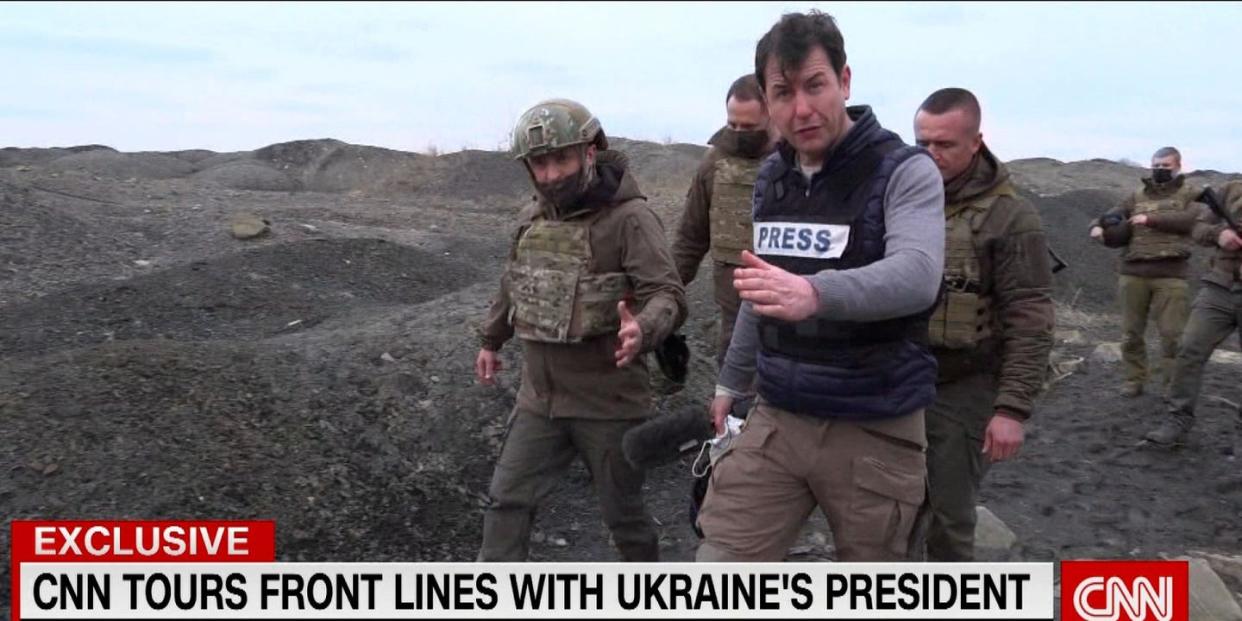
- Oops!Something went wrong.Please try again later.
- Oops!Something went wrong.Please try again later.
- Oops!Something went wrong.Please try again later.
CNN is back in Moscow. Correspondent Matthew Chance, who donned a flak jacket on a Kyiv rooftop on February 24 in a moment that came to signal the war in Ukraine had truly begun, had not been to his apartment in the Russian capital since December. In the time since, his employer made the decision to pull its staff out of Vladimir Putin’s realm after the Kremlin essentially made independent journalism illegal. Chance’s wife and daughter live in London, but much of his life is in Moscow. (He said he’s had to buy a whole new wardrobe over the last two months.) But now he believes he’s reached an understanding with the Russian government’s top brass, and the network is satisfied that the situation is safe. So he’s back.
Chance has clearly developed a different relationship to fear than the rest of us. 20 years as a foreign correspondent in war zones from Georgia to Libya to Ukraine will do that to you. Getting held hostage by Muammar Gaddafi’s security services in a Tripoli hotel, gun to your head, will do that to you. Chance returned from Ukraine in March, in time to celebrate his birthday with his family in London, and swung by New York on his way back to Eurasia. He came by Esquire’s offices in April to discuss all he’s seen and learned, in Ukraine and through the years. On Monday, he followed that up with some written responses via encrypted chat from on the ground in Moscow, where he described how things have changed at the center of Putin’s power. Below, the two conversations have been combined and edited for length and clarity.
Does it feel different on the ground in Moscow than when you left?
Yes, it feels somewhat different. Lots of shops have closed down or are selling off stock while prices of some products have spiraled upwards. On Russian TV there is an almost constant loop of news and shows discussing what Russia calls its “special military operation” in Ukraine.
And from the people I’ve spoken to—friends and associates—views seem to have hardened. Some are more appalled than they were originally, while others are more supportive than before.
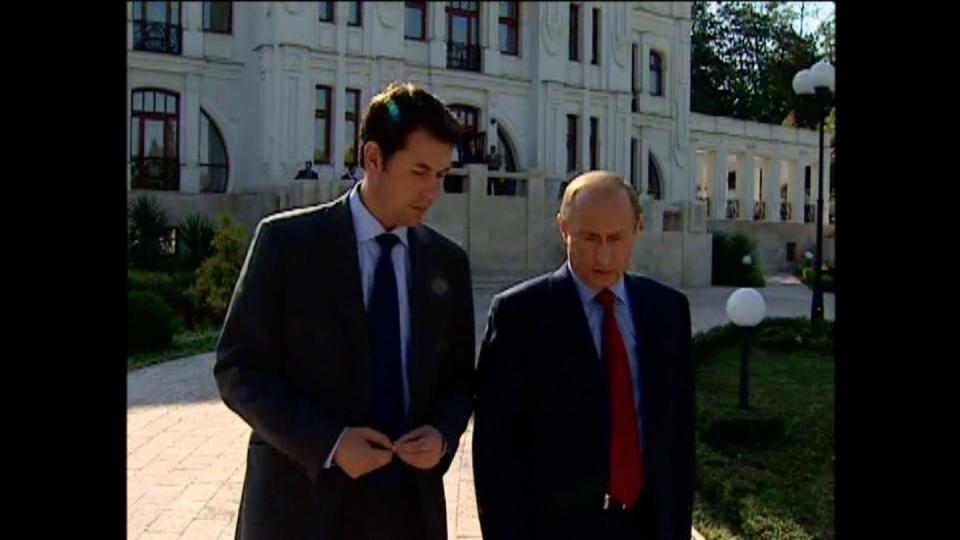
The main difference though is the reporting restrictions we are under. There are tough new laws being enforced to control how the conflict in Ukraine is described in media. It is a "special military operation"—not a war, not an invasion. Plus, there are laws which criminalize the broadcasting of information the Russian authorities regard as false. And punishment can be severe: up to 15 years in prison if you fall foul.
What do you hope to bring viewers with your reporting?
We want to try and bring viewers a perspective from inside Russia that has been difficult to obtain for the past two months, but is obviously incredibly important. How are Russians responding to the international isolation over Ukraine? How are families coping with the loss of Russian soldiers since the Kremlin sent the troops in? And how do ordinary people feel about the direction the country is taking?
It’s quite a challenge given the reporting restrictions now in place, but we have a responsibility to try.
You've interviewed Putin before. How'd that come about?
It was a different world back then. That was back in 2008, I think it was just after the Georgia war, and Russia was trying to work out how it wanted to play the international media. And they hired a Western PR company, they were advised to reach out to the international media. So one day, the Russians opened up to us and they gave us the foreign minister. I interviewed [Sergey] Lavrov, then I interviewed [Dmitry] Medvedev, who was at that time the president of the country. And then they said, "Okay, now we've got Putin for you." So in like a space of two weeks they gave us everybody. And they offered that to us. I've been lobbying them since then to get back with Putin. Be a good interview, right?
Yeah. I think he might abstain for a bit.
But who knows? I mean, you'd think that wouldn't you. But he does do interviews occasionally, and he likes the idea of showing these Western journalists what the reality is. He's actually quite good in interviews, it's not like you're going to catch him out. And when you say to him, "But you committed war crimes," or whatever you say to him, he's going to have his answer to that.
Right. He said this week that he'd "liberated" Mariupol.
They created a desert and called it peace. Totally destroyed the city. But this is something I've seen before, you know? That's what he does. It's what the Russian military does. They know that it's very dangerous to fight hand to hand in the streets, and so they stand back and let the artillery do the work for them. And that's what they did in Chechnya when they took me into Grozny in 2000. "We won," they were like, "It's great, isn't it? Come and see Grozny." And literally we were all like, "There's no buildings." There weren't any buildings standing in the city, and they were driving us through saying, "It was great, we won."
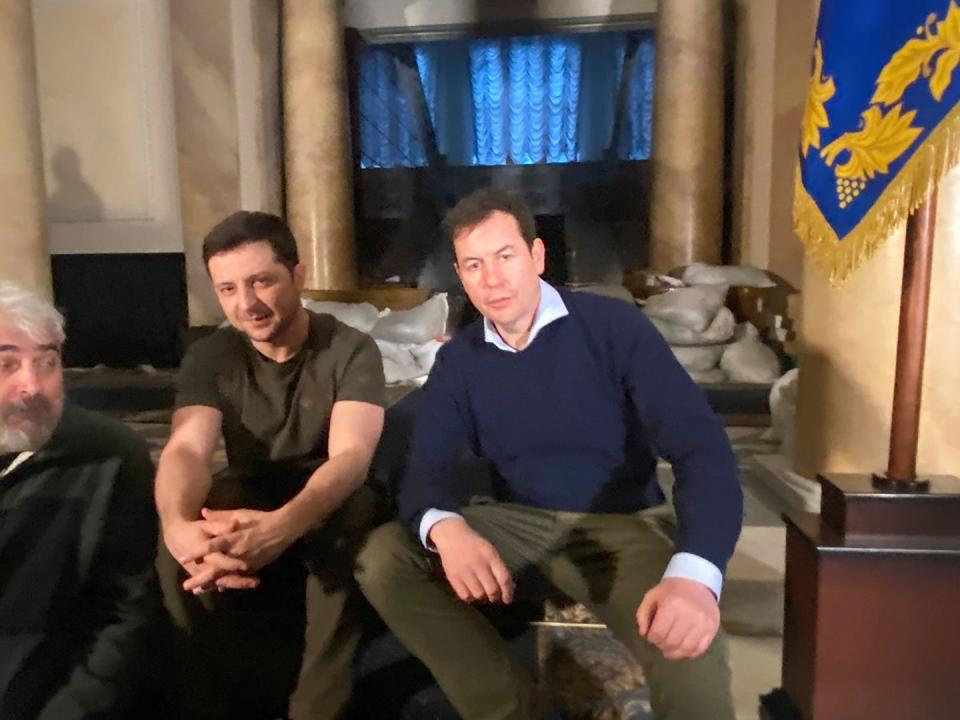
What was the most destruction you witnessed in Ukraine this time?
I went to a residential area that was hit by a cruise missile. So you see the damage that these things do. But it's only now, as the Russians leave [the Kyiv suburbs], and you can go into those areas relatively safely, that you can really see the full extent of what's happened. And our TV screens have been full of the most unimaginable horrors. At Irpin and Bucha, and at various other places. I never thought it would be that bad. I mean, who would have thought they would find cellars full of women naked, raped, shot in the back of the head. I mean it's just insane. It's insane.
Kyiv is a city of about 2.8 million people. And it virtually emptied when I was there. It's difficult to imagine though, isn't it? That you would have to gather whatever you can in a bag, if that, and get your children into a car and drive as fast as you can so that you don't get killed. And anybody who stays behind runs the risk of being brutally murdered. It's difficult to comprehend it, yet there it is. Right in front of us. And it's been happening to tens of thousands of people. So it's a reminder of what war does. It's so dehumanizing in that way.
It occurred to me when I was doing a live shot on this bridge in north of Kyiv. We came across this armored column that had been totally destroyed, it was a Russian armored column. And the bodies of the Russian soldiers had just been left there in the street, hanging out of the windows. We didn't show it on TV, but we opened up the back of one of the trucks and everybody's dead inside.
Hit by a Javelin or something?
Hit by a Javelin, yeah. You saw the destroyed vehicle, but if you looked inside the vehicle it was like these twisted corpses everywhere. It was horrific, because they were armored personnel carriers that had about 12 people in them. And it is left in the street for the flies to settle on, the dogs to eat or something. No one's burying them. No one took them away. Ukrainians aren't going to bury them. The Russians just disappeared, died or ran away. And it’s horrible to see.
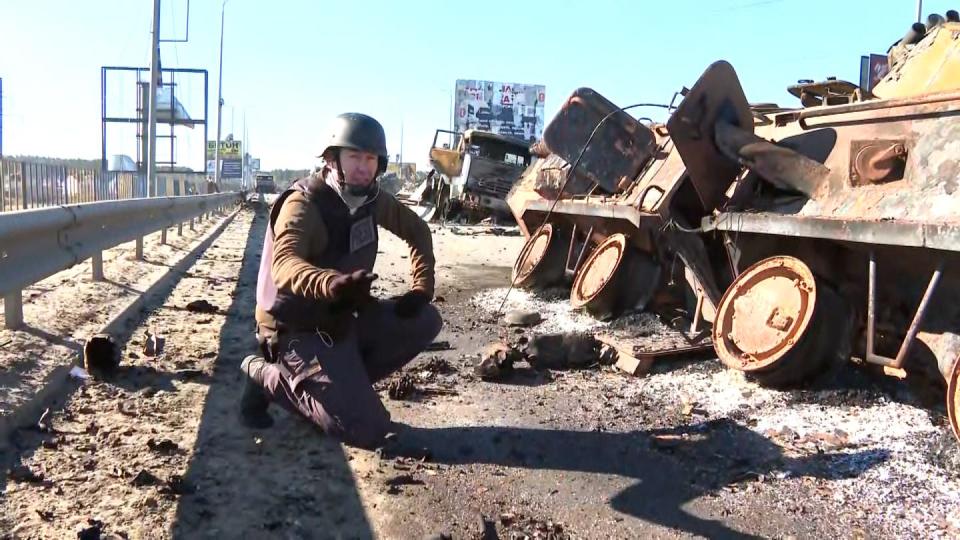
I was really consciously trying to not glorify this killing of people. A lot of them didn't even know they were going to war, a lot of them were like teenagers who were just told they were going for military exercises, sent there with not enough protection to get massacred by these big, very angry Ukrainian guys with Javelins. You know, you have to have some sympathy for that on a personal level. The individual Russian soldier who was sent in to this thing, he didn't even know it was happening. No one knew it was happening. I didn't know it was going to happen. I don't believe most Russian officials knew it was going to happen.
You interviewed Zelensky as well. What were your takeaways from that?
Zelensky, when I first interviewed him, which was on the front lines of the Donbas like maybe a year before this conflict happened, took me around the trenches. We flew up in his helicopter, he took me around. At one point we had to run for cover because there was open ground and there was sniper activity, and several people had been killed there. And it was just an incredible notion that I was running with the head of state through this open ground with our flak jackets on so we didn't get shot by snipers.
He didn’t just do that with me. He went to the front lines quite regularly to inspect the troops, to not just do a formal inspection, he'd go with a couple of people, a couple of special forces people for his protection. And he'd go right to the guy, the trooper right in the [most forward] trench, right facing the Russians, to go and have a cup of tea with them. See if they were all right, give them a medal. He’s very informal like that.
He's also incredibly brave, and I think that came out in that first interview. Now everybody knows it. Everybody can see that Zelensky is, for all the criticism of him—and there was some beforehand, that he was cracking down on oligarchs that weren't on his side.
How did that contrast with going face-to-face with Putin?
Putin's a lot more scary. He's a lot more intimidating. He doesn't like you to interrupt, and his answers are long. People talk about how they look in his eyes and you can see the KGB, or a glimpse of his soul. He's assessing you when he sits in front of you, and he tries to sort of make connections with you. He asks you about yourself, but he’s not…He's very deliberate, he's very calculating. And he does have a very commanding presence, and it's partly because you know that he has really something close to absolute power.
You mentioned running through a sniper zone with Zelensky—where does that rank amongst sort of the danger you felt? I know you were captured by Gaddafi’s forces in Tripoli. Was that the most scared you’ve ever been?
Funny enough, I think it was. For a start, the whole area was being bombed. Usually when you're in a war zone you have a degree of latitude so that if you don't feel like you want to be there, you can get in a car and drive away. You can hide behind a building, you can walk away, you can run. Running away is a great asset, to have that ability to go, "I'm not going to go there. I'm not going to do it." The problem I had in the scary bit of the Rixos Hotel in Tripoli was that suddenly that opportunity, that ability was taken away. I had never been held captive before, obviously. Well, it's not obvious, but I hadn't been held captive before. And it was just this terrifying experience, because you can't go anywhere. That keeps you up at night, you know? Because we didn't know what was going to happen to us, but there were lots of stories coming to us that other people in a similar situation—I don't know whether they were true or not, but there were stories—had been executed.
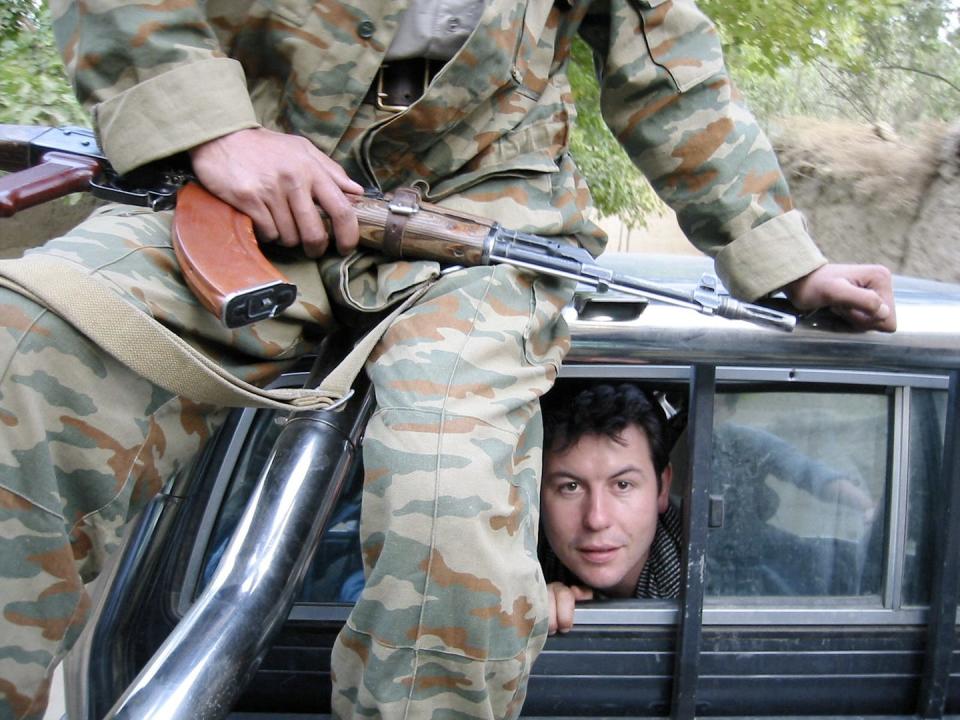
And you're with a bunch of people that are total nutters. Guns to our head. They were like, "If you've got a sat phone we are going to kill you." And I'm like, I have two sat phones, one in each pocket. And they were like, "Have you got a sat phone?" And I'm like, "No, I don't have a sat phone." Thank God they didn't check, because I had two.
So it was like that all the time. And then, of course, we ran out of food and water, there was no electricity, it was boiling hot, like the middle of Libya, right? Amazingly, we got out of that. [CNN producer] Jomana [Karadsheh] did the negotiating, but I remember before she had that conversation, she was like, "What am I going to say?" I'm like, "This is your moment. You have to ham this up big time." And so she started to cry. She's an Arab woman who was there as a producer, and convinced one of the guys that the world had changed outside the door of the hotel and they should let us go.
And they called in the Red Cross and they evacuated us. And as we were leaving the guys outside, it was all these big Mujahideen outside, they hated Gaddafi. They were cutting the throats of these guys [our captors] as we left. We saved one of them. It was this old guy, he'd been in Gadaffi's army for ages. We got rid of his uniform, got rid of his gun, put him in civilian clothes, and he came in the car with us and came out. Everybody else was [throat slitting motion].
So Gaddafi’s guys were done for?
They were done for. The Islamists who toppled Gaddafi, they went into the hotel as we went out.
So when you leave a situation like that, or even Ukraine, you get to the Polish border, what does that feel like?
With the Tripoli experience, immense relief, immense relief. With the Ukraine experience, I didn't have that sense of relief. I wanted to get back so I could be with my daughter on my birthday, but I wasn't under the same kind of threat to my mortality, I don't think. A lot of those people died in that situation, but I didn’t have a gun to my head.
But we work very hard, you know? So there's that aspect of it as well. It's not just the danger you face, it's the fact that I'm up all night doing live shots on the primetime shows. You translate that, it's the five, seven, and nine shows, which are the shows that I tend to do on prime time here, you translate that into Ukraine time. It's like five o'clock in the morning, you know? You're kind of up all night, and then you've got to be up in the daytime as well. For two reasons: first of all, you've got to cover the story that's happening in the daytime, and you've got to eat. If I miss breakfast, that's it. You know, you didn't get anything else until six o'clock at night. So I'd like struggle to go to bed at 5:30 in the morning, get up at like eight to go and have some breakfast, go back to bed for a bit and then go out. So it's quite exhausting physically and mentally.
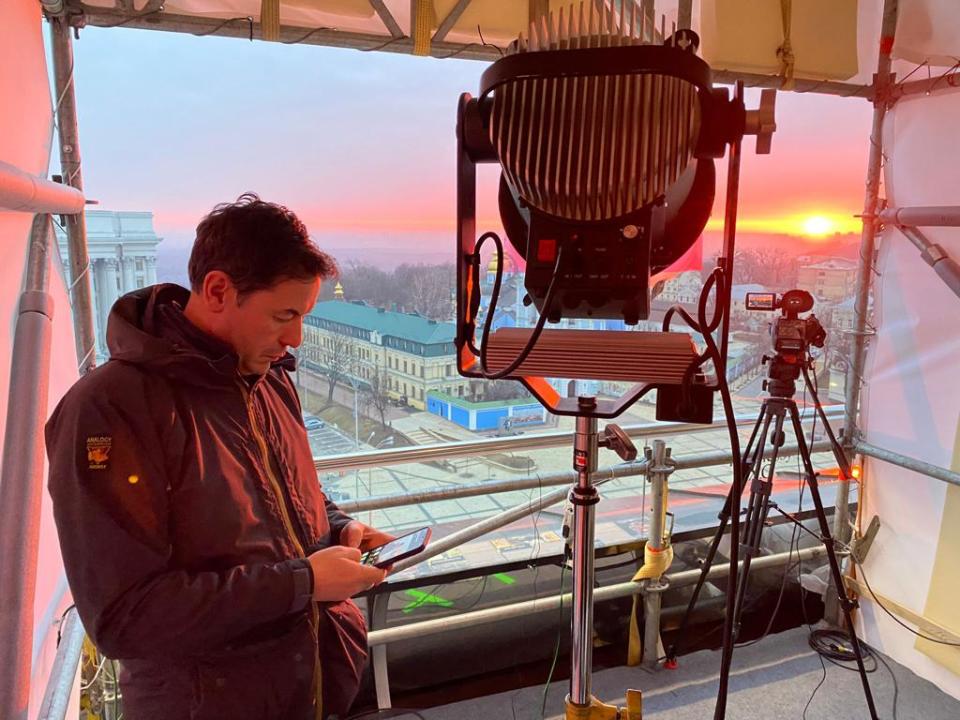
When you go on an assignment like this, how do you talk to your family about that?
My daughter, she’s 16. She's lived with it. I've got a picture of her in front of the television screen when I was in Libya, and I had just got out of the hostage situation.
We had a situation at the school. She's in a really nice school in London, and there was a security threat against me and we had to alert the school. And her history teacher loves me. Watches CNN, so he's always like getting her around and saying, "What's your dad doing?" And so she kind of likes it, I think. But we do spend nowhere near as much time as we should with each other. And as she's got older, it's tricky. In Ukraine, she was quite angry with me. She was like, "I can't believe you did that. I can't believe you went and saw those Russians and went that close to them. I can't believe you went to that bridge, why are you doing that?" And so I'm constantly having to assure her—and it's true, by the way—that I'm doing everything I can to make sure that we are doing it safely. I don't want her to be made an orphan, and I don't want me to be killed. So we're on the same page on that.
The front lines are moving all the time. How do you make decisions about where you can go?
Well, you don't make it alone. We have security advisors that help us make that decision with actual intel that they get from other security advisors and news reports that we all piece together and work out where we can go, where we can't go. What's risky, what the risk is. You can't do it risk-free, it's inherently risky. And so you have to try and sort of work out how you can drive around the risks, mitigate the risks.
But you have to remember that when you're covering a war, there's always a random aspect of it. There were a bunch of people, Ukrainians, terrified, waiting for the Russians to invade, who were all given guns. Thousands of people. They gave out thousands and thousands of Kalashnikovs with ammo and said, "Right, defend your neighborhood." And those people were very, very twitchy. If they saw you and they didn't know who you were, they could have shot you. We got taken out of our car a couple of times just driving along the road, guns like this [pointed at him], "Who are you?” And we're like, "No, no, no, we're journalists, we're journalists. It's fine. It's fine." And then somebody else would come up with a gun. That's really dangerous, because these people aren't your enemies. And once they know who you are, they're fine with you. Right? But they're so twitchy, and they've had so many people killed, and they’re not trained soldiers. They're going to shoot first and then sort of work out who they shot afterwards. Which is understandable actually, and I'd probably do the same, frankly.
You kept an apartment in Moscow—
I've still got one. It's a great apartment. It's collecting dust. I've got a Rocket espresso maker I just bought. It’s changed my life.
Superior to Nespresso?
Oh God. I mean, it's a different world. It's a different world. It's proper, the proper thing. So for that reason alone, I've got to go back.
No, no, I mean in all seriousness though, it is quite scary because I left the apartment just after Christmas and I went to Ukraine, and I took my stuff with me to cover the war in Ukraine, and I haven't been back. My whole life's there. I've had to buy all new clothes. My bank account's got frozen. We're working out how we get back into Russia, but because of the laws that have been passed there, I think it's the right thing to do to very carefully assess whether we can take that risk. Because the Russians have passed the law basically outlawing journalism, they call it outlawing the deliberate spread of fake news. But fake news, of course, in Russia as here, is news that they don't agree with. From a personal point of view, I need to go back, but it's a bigger conversation. I'm only worried about what happens when I get to the airport in Russia. That's it. If I can get through the customs at the airport and get in, I'd be fine, I think.
Are you on the sanctions list?
No, not sanctions. No. But who knows what lists there are that I'm not aware of?
You Might Also Like

